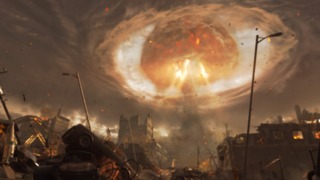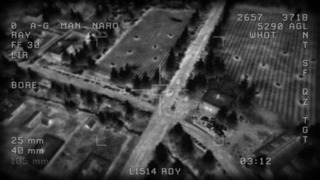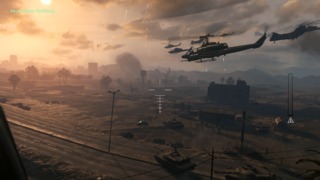Why Call of Duty 4's Warfare Wasn't So Modern
By gamer_152 8 Comments
Note: The following article contains major spoilers for Call of Duty 4: Modern Warfare.
It's been almost ten years since Call of Duty 4: Modern Warfare turned the shooter space upside down. At the time, it was praised not just for its big action set-pieces, the rushing pace of its campaign, and its introduction of RPG-like progression and unlocks to its multiplayer, it was also regarded as advancing the thematics of military shooters. For a lot of people, the supposed realism of CoD 4's campaign was like a cold slap in the face. It gave the impression of being a new breed of military FPS not just because of its work in gameplay and story delivery but also because it replaced the endless WWII flashbacks of nineties shooters with images of terrorism and instability from the Middle East that Brits and Americans associated with then-current warfare. Some took its portrayal of a radical Middle-Eastern terror cell as bleeding-edge, something you could have seen on the evening news, but in retrospect, Modern Warfare's warfare wasn't that modern. The single-player took less inspiration from the wars in Iraq, Afghanistan, Pakistan, and Yemen, and more from older Cold War fears.

Sure, Modern Warfare had Khaled Al-Asad and the unnamed Middle-Eastern nation, but they were only tinder for a panic about Soviet Russia and nuclear strikes that swelled through the back half of the game. Al-Asad sets off a nuclear warhead but no such thing happened during the real Middle-Eastern conflicts, and so the image of a mushroom cloud over a civilian town comes off as a product of Cold War nightmares more than post-9/11 invasion. As it turns out, the bomb was Russian anyway, given to Al-Asad by Russian "ultranationalist" Imran Zakhaev. The hunt for Al-Asad was a red herring, and his terrorist group does not exist as an end or primary antagonising force for the story, their main purpose is to set up the real bad guys who are the Russians trying to restore the glory days of the Soviet era to their country. To pursue Zakhaev, you visit Pripyat: the town wiped bare by the Chernobyl disaster. That accident happened in 1984, and again, reflects twentieth-century discomforts about nuclear technology, not anything from the twenty-first-century.
The game ends in the ultimate Cold War terror: The Russians launching nuclear ICBMs at the United States and the sequel soldiers onwards with this theme of old-school Russians threatening American livelihoods. I know a lot of people saw Modern Warfare 2 as a departure from the original game and it was in that the "ultranationalists" carved out a larger space for themselves in the plot and that the politics involved were more fantastical than before. However, its fear of Soviet Russians as a player in global warfare was nothing new. There are probably two reasons why Modern Warfare retreats from its contemporary images of Middle-Eastern violence into this Cold War stupor.

The first is that the Islamic terrorist groups which Modern Warfare bases its secondary antagonists off of didn't pose an existential threat to the United States. After September 11th there were a handful of attempted terrorist acts over the following decade, but nobody woke up in a cold sweat because they thought a man could press a button in Baghdad and wipe a whole coast off the map, the threat posed by Islamic terrorists was smaller than that. Modern Warfare wanted a big action movie finish; it wanted you to stop something that could cripple the United States as a country, and the only threat in living memory for which that was true was the threat of nuclear war from the Soviet Union.
The second and more ironic reason is that the images of Middle-Eastern terrorism were probably so contemporary that they were not yet part of a highly developed symbolism of global warfare. When we see nukes and Soviet Russians in media, we have a clear grasp of the symbolism at play and quickly understand the tropes and suggestions involved. Not that there weren't shared concepts of Middle-Eastern terrorism in the public consciousness at the time, but the ideas about Cold War threats to the first world had had more time to percolate, and there had been more time for a shared cinematic language describing Soviet Russian nuclear threats to develop. An angry Russian with a nuke was a codified cultural concept in the United States for which there was yet no substitute. Not that Modern Warfare couldn't have taken a different direction, but as a game made by and aimed at Americans that was trying to give its audience a sense of fear for their country, Russian nationalists launching nukes at them was an easy concept to fall back on.

This isn't meant to be a scathing critique of Modern Warfare as much as a clarification about the nature of its story, but there you go. Modern Warfare is mostly only modern in the context that the Cold War could be considered modern and there are unique advantages to going for a less modernised view of war in your war story. Thanks for reading.